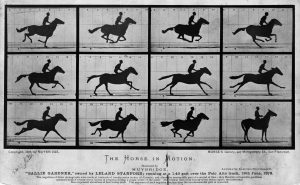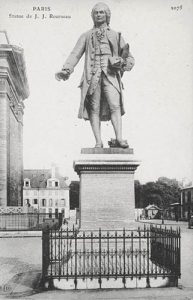Readers, Writers and Critics: Rival Interpretations of Art from Baudelaire to Borges
Copycat, imitator, wannabe, mimic – these synonymous insults are thrown at those who dare to be derivative. Imitation and replication hold negative connotations, signalling an unimaginative work and an immoral artist.
Imagination in the Mechanical Age
Although Baudelaire’s concern for the preservation of imagination in art is respectable, his romanticized vision of the merit of pre-industrial painting is overly simplistic […]
Algorithms and Taste: Revisiting Baudelaire in the Age of Streaming
If there were concerns in Baudelaire’s time about the public’s taste impacting art, then, when observing today’s day and age, these concerns are only amplified with social media and algorithms holding power […]
“And Yet, We Hear a Band”: Transgressing Fantasy, Form, and the Flesh in David Lynch’s Mulholland Drive
Drawing upon Sinnerbrink’s claim, a formal analysis of the film’s structure alongside McGowan and Sobchack’s ideas reveals the juncture where Mulholland Drive transcends fiction to become a self-reflective mode of philosophy.
Human Existence as a Lapsarian Narrative: Rousseau, Natural Humanity, and Enlightenment in A Discourse on Inequality
Though A Discourse on Inequality views human history as a narrative of decline like many pre-Enlightenment philosophers did, its argument is based on Enlightenment-era principles of reason and evidence […]
On the Essentiality of History to Orlando and Around the World in Eighty Days
I argue, in contrast, that a closer reading of either text suggests that both Verne and Woolf engage in criticism of blind adherence to standard time […]
Deforestation of the Mind: The Inevitable Dangers of Cultivation and the Bliss of Ignorance in Mary Wollstonecraft’s Letters Written During a Short Residence in Sweden, Norway, and Denmark
[…] it is also made clear many times throughout the text that imagination in excess is dangerous and to an extent uncontrollable, causing Wollstonecraft to believe that ignorance, in contrast, is the only path to true bliss.
Living Through the Gaze of Others: A Discourse on The Odyssey
Though Rousseau published the text in 1755, over a thousand years after Homer’s Odyssey was likely composed, there are notable examples of Rousseau’s ideas already in play within the characters and events of The Odyssey […]
Occupying the Uninhabited Space: Modernism and Postmodernism in The Dispossessed
By resisting rigid ideological classifications, Le Guin forges a kind of “postmodern modernism” or a negative space between the two binaries that reflects her Taoist belief of balance through paradox.
“Where do you reckon that paradise is at?”: Deconstructing Western Mythology through Landscape in All the Pretty Horses
At its core, All the Pretty Horses is a deconstruction of Western mythology, in which the aspirational cowboy dream is evaluated and shown to be unattainable.









